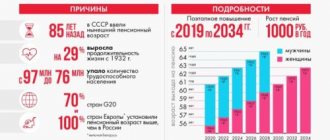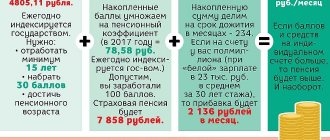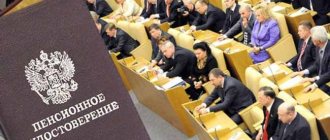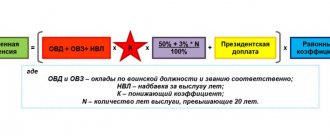Who is entitled to the presidential pension?
According to the law, this type of material support is assigned to persons who held the post of head of the Russian Federation, subject to the following conditions:
- To receive a presidential benefit, a citizen must not receive wages for public service.
- After going on vacation, it is not necessary to be the leader of the country.
- Half-sun skirt pattern
- How to remove ads on Skype
- How to enable flash player in Yandex browser
Pension of the heads of the Federation Council and State Duma
One of the most scandalous persons in Russian politics is the former governor of St. Petersburg, now the chairman of the Federation Council, Valentina Matvienko. Her monthly pension, as it turned out in 2019, exceeds 400 thousand rubles. It follows from this that her monthly income is equal to approximately 30 pensions of “ordinary” pensioners, not counting the salary of the head of the Federation Council and other pleasant bonuses.
It is noteworthy that just recently Valentina Ivanovna criticized the bill on a guaranteed pension product, admitting that citizens of the Russian Federation living from paycheck to paycheck simply do not have the opportunity to save for a future pension.
Ex-head of the State Duma Sergei Naryshkin, who also recently reached retirement age, receives approximately the same pension as the head of the Federation Council. It is too early for his successor Vyacheslav Volodin to think about retirement - he is “only” 56 years old.
As for the pension of an ordinary State Duma deputy, it is about 50 thousand rubles for a service record of 5 to 10 years and more than 60 thousand for a service record of more than 10 years.
How is it calculated
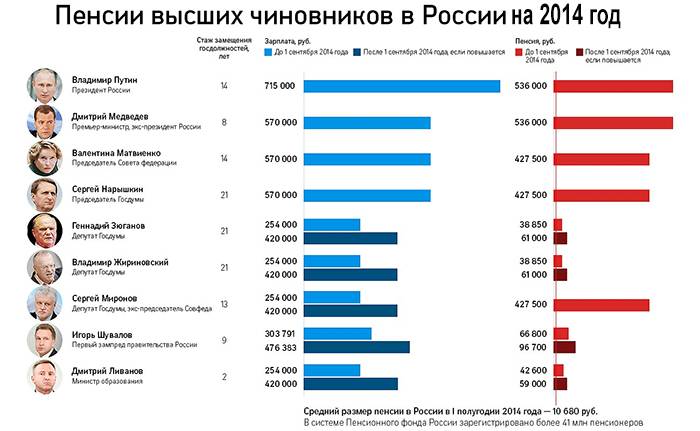
The retirement age for civil servants is 65 years. After registration of the right to a well-deserved rest, the head of Russia receives an allowance equal to 75% of his earnings. The law provides for annual indexation of presidential payments.
For many top-level officials, the amount of pension accruals depends on the length of their tenure. For example, if the prime minister held his position for 3 to 6 years, he can receive financial support, which is 55% of his earnings. This norm is invalid for the head of the Russian state. The amount of the pension benefit is fixed, there are no additional payments or bonuses determined by the time of work.
- How to take Viagra
- A new service from Sberbank that helps pensioners find work
- Pickled tomatoes for the winter
Benefits for civil servants at different levels in 2020
Since the beginning of 2020, pension changes have been predicted in the usual format - indexation and a slight increase in last year’s rates are expected. What changes should civil servants expect regarding retirement?
- There is no age limit for certain officials working in government bodies; there is no age limit for deputies. They have the right to work until the end of their term of office.
- Civil service leaders retire from office when they reach 70 years of age. The only caveat is that this age still needs to be agreed upon with the federal government authority. All other civil servants stop working at age 65.
What content is required for the President of the Russian Federation?
In 2020, the monthly salary of the head of state is 715,500 rubles. If he retires before the next indexation of payments to civil servants, then the amount of presidential support will be 715,500 x 75% = 536,625 rubles.
As the leader of the country, the Supreme Commander-in-Chief, the President of the Russian Federation has access to state secrets. After resignation, measures must be taken to protect these secrets. The law provides for opportunities to preserve the health of the former head of Russia.
The privileges of the President after retirement include lifetime granting to him:
- security;
- special communication;
- transport;
- medical services in special medical institutions for civil servants;
- official assistants;
- state dacha.
What kind of pension does President Putin receive?
Let's start with official information almost first-hand. It is clear that Putin himself did not speak on this topic, but there are comments from his press secretary Dmitry Peskov.
In January 2020, Peskov gave an interview to “Arguments and Facts”, where he mentioned that Vladimir Putin receives a presidential salary and a military pension
. Peskov could not say anything concrete about the amount of pension and salary:
This material was stolen from the site. It happens. Most likely, the stolen version is missing a lot of the information you need. For example, useful links in the article. Visit www.newsment.ru to read the original article and find lots of other useful information!
“I can’t tell you exactly what his pension size is, I don’t know. As for the salary, it is set by presidential decree, just like the salary of the prime minister.”
We will try to roughly estimate the size of the president's pension a little further. Most estimates are limited to the fact that the average military pension in Russia is about 30 thousand rubles. Apparently, Putin receives some such amount on his bank card, observers conclude.
For now, we are more interested in why Putin receives a military pension. In 2012, the president turned 60 years old and could receive a regular old-age insurance pension. Then no questions would arise.
But now questions remain. To qualify for a military pension, according to Russian law, 20 years of service in the armed forces or equivalent structures is required. In this case it is the KGB-FSB.
Putin's official biography states that the current president served in the USSR KGB from 1975 to 1991. The exact date of entry into the service is not known, but it happened after graduation, that is, in the summer. Vladimir Putin left the KGB on August 20, 1991 - at the height of the putsch, one of the organizers of which was the head of this special service, Kryuchkov.
In the Soviet years, therefore, we count a full 16 years of military experience. Maybe a month or two more.
From July 25, 1998 to August 9, 1999 (a little over a year), Putin headed the Russian FSB, which gives him some more military experience.
That's it, in the biography of Vladimir Putin we find 17 years and several months of service, which by law is equivalent to military service. Obviously, Putin’s military pension is not related to either disability or the loss of a breadwinner. Participation in hostilities, which would give the current president preferential service like “two days of service per day of service,” is also not in Putin’s biography. The question hangs in the air.

Rare shot of Vladimir Putin paying in cash in rubles
A decent pension for ex-governor Polezhaev amounting to more than 200 thousand rubles
The former head of the Omsk region will receive a monthly supplement to his pension. The news caused a wide resonance, but the regional Ministry of Labor called this accrual legal
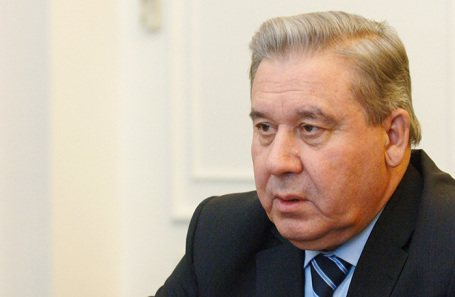
Leonid Polezhaev. Photo: Alexander Saverkin/TASS
“From January 1, 2020, pay a long-service pension in the amount of 224,206 rubles 83 kopecks per month in addition to the pension assigned in accordance with federal law,” says the order of the Ministry of Labor of the Omsk Region regarding Leonid Polezhaev. He headed the Omsk region from 1990 to 2012. Whether he received the same pension all these eight years spent in retirement, or whether the bonus was only established now, there is no official answer to this question. But, perhaps, before 2020, the former governor’s pension was unlikely to be fundamentally lower - otherwise why would it have been raised only now?
The former head of the region is remembered in the region only in connection with his desire to restore churches, nothing more, Nikolai Eichwald, a correspondent for the NGS-55 publication, told Business FM. He explained the sudden publication of the photo of the order by the fact that Polezhaev is celebrating his 80th birthday any day now.
Nikolai Eichwald correspondent for the publication NGS-55 “This is such an interesting, perhaps extravagant version - someone decided to make a kind of anti-gift for the anniversary. And he leaked the document. Do you understand? This is the option."
According to the journalist, Polezhaev has plenty of ill-wishers in the region. Like, probably, any former governor. Many of whom are also not poor in retirement. As practice shows, an ex-governor with a large pension is rather the norm. Everything is according to the law, the only question is that the system for calculating this pension remains not very transparent.
A year ago, Komsomolskaya Pravda calculated the pensions of former leaders of several Russian regions. Thus, according to the publication, the ex-governor of the Rostov region Vladimir Chub, according to local law, receives a monthly bonus of 80% of his salary as the head of the region - 200 thousand rubles. Former head of the Samara region Nikolai Merkushkin - 23 thousand rubles of a regular pension and 129 thousand rubles of an allowance for leadership of the region. And Aman Tuleyev, officially recognized as the “people's governor” of the Kemerovo region, who led the region until 2020, receives a total of about 400 thousand rubles in retirement. There is simply a pension, and a bonus for the people’s governor, as well as payments for the fact that Tuleyev is an honorary citizen of 12 cities and seven districts. A little from each.
The governor's pension itself is not considered quite the same as the pensions of other citizens, says lawyer Alexandra Voskresenskaya.
Alexandra Voskresenskaya lawyer “They calculate work experience a little differently. The percentage is calculated differently - there, on how much they earned, roughly speaking. According to this law, they are included in a separate category of citizens. You can, in fact, come up with a lot of legal things so that the output would be such a pension calculation.”
And then each region is free to adopt its own, local laws establishing certain allowances, continues lawyer Alexander Nabatov.
Alexander Nabatov lawyer “Federal laws do not particularly limit pensions for local officials. In the regions, many people take advantage of this through their internal by-laws and regulations; they already give themselves all sorts of allowances.”
Of course, there were personal pensions in Soviet times. True, they did not differ from the usual tens of times and were awarded according to more transparent rules. Business FM asked the head of the Kaluga region, 67-year-old Anatoly Artamonov, to talk about how the governor’s pension is calculated now. Anatoly Dmitrievich, unfortunately, could not help with the methodology. But he talked about his pension.
Anatoly Artamonov, Governor of the Kaluga Region “I can say right away that I don’t know. Honestly. Yes, my pension is 18 thousand rubles, I don’t know anything else.”
On the other hand, we should not forget that Anatoly Artamonov is still the current governor. Perhaps the home region simply has not yet had time to appreciate the leader’s contribution.
Add BFM.ru to your news sources?
The mayor of Voronezh's pension will be complained to the Prosecutor General's Office
Social activists are going to write complaints to the Prosecutor General's Office about the pension calculation system for the mayor of Voronezh. Activists of the “All-Russian Popular Front” calculated that the mayor of the capital of the Black Earth Region could receive up to 320 thousand rubles monthly in retirement! It is noted that the average pension of a Voronezh resident is 11,178 rubles.
Activists are preparing an appeal to Prosecutor General Yuri Chaika. “Front-line soldiers” are asking for a prosecutor’s review of local laws that allow for a special calculation of the pensions of municipal officials.
Meanwhile, the Voronezh City Hall was very surprised at the indicated amount. City administration specialists are wondering what scheme social activists used to calculate the maximum amount. They suggested that Gusev’s declared income was taken as a basis - more than 6 million rubles for 2014. But as it turned out, almost half of this amount is income not related to the position of mayor. This is profit from deposits, from the sale of an apartment (more than 2.5 million rubles), rental of some property and a pension for working in hazardous work.
The mayor's office, with references to the relevant regulations, reported that the long service pension is assigned “if there is at least 15 years of municipal service experience.” In this case, the amount of the surcharge is determined “depending on the length of service in the municipal service from 45% (15 years) to 75% (25 years) of 0.8 of average earnings minus the old-age insurance pension.”
— Currently, the length of service in the municipal service of the head of the urban district of the city of Voronezh is Gusev A.V. is 6 years. If you reach 15 years of municipal service, the estimated amount of the additional payment to your pension could be 54,290 rubles, concluded the Voronezh administration’s economics department.
It is now impossible to calculate the exact amount of Alexander Gusev’s pension, since it is not yet known how many more years he will work as mayor of the city.
Gusev himself spoke about his salary at a press conference a year ago.
“I receive 158 thousand rubles into my current account every month,” he admitted. — But there are quarterly bonuses. If you average them, it comes out to 180 - 185 thousand per month. This is my salary. But since August, I have another source of income - a labor pension. This is 15,900 rubles.
Let us recall that in the summer a scandal broke out in Voronezh over regional officials and their “golden parachutes”. A law has surfaced, adopted by the Regional Duma and signed by the governor, which significantly increases the pensions of officials and expands the list of privileges for them. In particular, now the governor of the Voronezh region, who has served one term, upon retirement, will receive a one-time monetary remuneration in the amount of six months' earnings, as well as medical care for himself and family members, insurance in case of death or injury, annual compensation for vacation costs, as well as the right to “prompt reception” by any regional official. For a governor who has served two terms, the payment is doubled. In addition, the regional authorities will be required to provide him with lifelong personal security, special communications, a car with a driver, reimburse the costs of medicine, pay the costs of using VIP areas of airports and train stations, and also, if necessary, provide him with housing. Even former ministers of the Russian government do not have such privileges.
The law also provides for an increase in the so-called long-service pension for all officials. A separate long-service pension for officials existed back in the USSR. In modern Russia, each region sets the conditions for its calculation independently.
How will this pension increase? In the Voronezh region, the amount of long-service pension for officials is 0.8 of the monthly salary in the last 12 months of their work before retirement. The monthly allowance includes salary, allowances (and government employees have many of them), bonuses, financial assistance, and vacation pay. To calculate pensions, there is a so-called monthly salary ceiling. According to the previous law, it was 3 salaries. Now the ceiling has increased: up to 7 salaries for persons holding civil service positions in the “managers” category, up to 5 salaries for persons holding senior positions in the civil service, up to 4 salaries for persons holding main positions in the civil service.
How pensions are calculated for deputies of the State Duma
With the constant discussion recently of issues about pensions for Russian citizens in connection with legislative reform, the most important question concerns the size of pension payments. There is a Federal Law that regulates all issues related to the status of servants of the people.
The government has introduced amendments to this bill that are designed to improve the pension provision of citizens who served as parliamentarians and retired due to age.
The amount of pension benefits for deputies is affected by length of service and salary, according to the law. In this case, the amount of payments is directly dependent on the period during which the parliamentarian performed his duties.
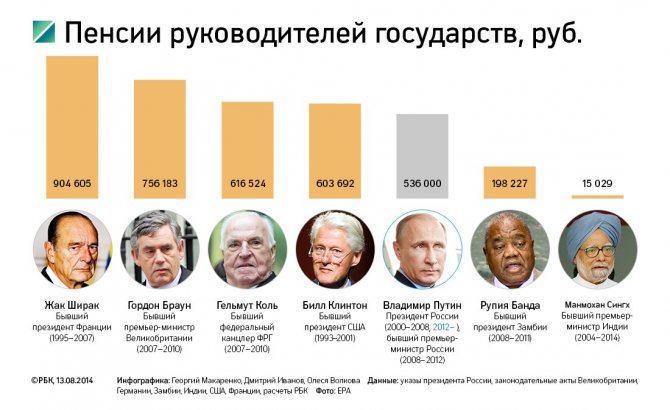
In 2014, the salaries of State Duma deputies increased from 253,000 rubles to an average of 400,000. Accordingly, their old-age benefits increased to 61,000 rubles.
At the beginning of August 2014, the government decided to impose a moratorium on the transfer of the funded part of citizens’ pensions to non-state pension funds. As a result, a tariff of 6%, which was previously sent to the funded part, in 2014-2015. should be sent to the administrative department. As a result, the funded part became voluntary.
Indexation of pensions in 2015-2017 increased pensions at the rate of inflation. Thus, all measures taken by the government are similarly reflected in the payments of retired deputies. Only the difference in the amount increases the standard of living of ordinary citizens and high-level officials differently, since the size of their pension benefits is not comparable with the payments of other citizens.
In accordance with the law, their accruals are calculated as a percentage of wages. Accumulated points (ACP) are also a direct reflection of the salary received. Therefore, you can roughly calculate the size of your pension.
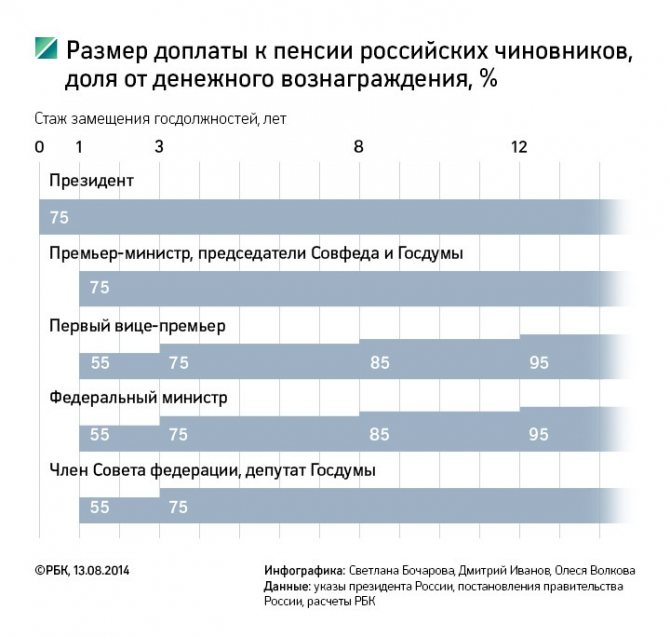
We must not forget that when applying for a pension, deputies, like all citizens, present to the Pension Fund a work book, which contains records of previous places of work. The employer at the previous place of work made contributions to the Pension Fund, and funds were accumulated for the formation of a future pension.
Deputy experience is also taken into account. Usually it is calculated in one, maximum two terms, that is, 4-8 years of work in government bodies. Based on the deduction of 22% from a salary of 400,000 rubles to the Pension Fund monthly, parliamentarians receive a significant increase in pension payments.
Where it leads
In a situation where the average pension in the country does not reach 15,000, setting such pension payments for yourself means provoking society to discontent.
The problem of social justice is very acute in Russia; in the richest country in the world, the gap between rich and poor has reached alarming proportions. The middle class is disappearing, but the number of families struggling to make ends meet is growing.
In the United States, wealthy businessmen have taken the initiative to introduce higher levels of taxation for excess income, despite the fact that America already has a progressive, rather than flat, personal income tax.
In Russia, we will not hear anything like this from the oligarchs; moreover, any attempts to revise the taxation mechanism, which would depend on the amount of income, are immediately stopped, and not even by moneybags, but by officials and deputies.
The procedure for calculating insurance pensions for deputies of the State Duma of the Russian Federation in 2020
The total amount of paid pension compensation for former deputies is regulated by the Law of the Russian Federation of April 19, 1991 No. 1032-1 “On Employment of the Population in the Russian Federation” and the Federal Law of December 28, 2013 No. 400-FZ “On Insurance Pensions”. According to these legislative acts, the pension of a State Duma deputy in 2020 combines the following components:
- insurance pension assigned for old age or disability;
- monthly additional payment to the basic amount of payments – from 55 to 75%;
- lifelong maintenance with monthly payment;
- additional financial support paid every month.
The procedure for calculating the insurance pension of deputies of the State Duma of the Russian Federation in 2020 provides for the use of two indicators: an individual coefficient and its value on the day the payment was assigned. This algorithm does not differ from that used for other categories of the population that apply for an insurance pension.
A significant role in calculating the amount of compensation due to former deputies is played by the base salary, the value of which this year reaches 81,500 rubles. Calculated on the basis of this amount, the average pension of State Duma deputies in 2020 is about 18,000 rubles.
However, as analytical data from statistical monitoring indicate, this is only a small part of the total expenses of the Pension Fund for the maintenance of retired deputies. Additional allowances and surcharges exceed the basic component several times and can range from 44,000 to 77,000 rubles. The total amount of such payments to former “servants of the people” reaches about 90,000 rubles.
A tale of justice and decency
The average pension in Russia is 14,825 rubles. To increase it to 20,000 rubles by 2024, the so-called pension reform was launched, which, to put it mildly, did not find understanding among compatriots.
Ordinary people are even more indignant at the amounts that have been appointed as “servants of the people” for their old age in the regions of the country. While ranting about the necessity and benefits of reforms, officials and deputies assign themselves pensions of several hundred thousand, knowing full well that the bulk of the population can barely make ends meet.
Local officials, without a twinge of conscience, and at the legislative level, set their pensions at several hundred thousand.
Thus, Kamchatka adopted a law that establishes special regional additional payments to the pensions of senior officials and deputies. On average they amount to 150,000 rubles.
By the way, the same officials handed over an entire island in the Kamchatka Territory with an area of 2000 square meters. km into private ownership for 49 years for only 15,000 rubles per year.
It turns out that one former deputy of the regional legislative assembly will receive more pension in one month than the entire region from renting a unique island in one year.
In Petropavlovsk-Kamchatsky in the summer there were protests against the excessive increase in pensions for local servants, but for some reason our numerous media kept silent about this. The point is that, despite the protests of the people, Kamchatka officials and deputies still retained their pensions of 150,000 rubles.
The picture is similar in other regions of the country. In the Omsk region, about 180 million rubles have already been allocated for the pension provision of officials in 2020, and in the Voronezh region - 202 million; here, individual officials have been given personal allowances of 250,000 and 300,000 rubles per month, and this is in addition to the pension that the Pension pays them fund.
For ordinary people - an increase in the retirement age, for their loved ones - special additional payments at the expense of those whom they force to work until their death.
Rosstat published data on the median salary among workers in large and medium-sized enterprises in the country, so they receive about 34,000 rubles per month. In such a situation, assigning pensions to former officials at 300,000 rubles, to put it mildly, is not an entirely adequate position, in fact, a real provocation.
Today, the pension of a State Duma deputy is on average 60,000 rubles, for an official of the Government of the Russian Federation - from 80,000 to 100,000 rubles, for a federal judge or prosecutor - 150,000 rubles per month.
A pension of 300 thousand is small for a senator. And officials strive for a hundred
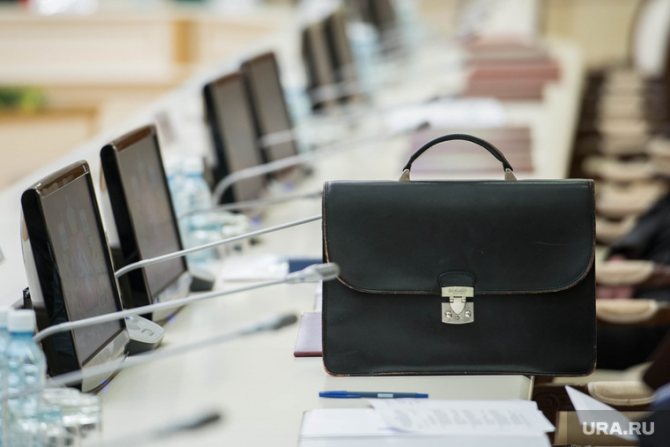
Many officials are literally praying for a future pension Photo: Vladimir Zhabrikov © URA.RU
The increase in pensions for officials in Kamchatka turned into a huge scandal this week. The General Council of United Russia criticized the decision of the head of the Kamchatka Territory, Vladimir Ilyukhin, who signed a law that will allow the use of increasing coefficients when calculating pensions for civil servants. Such conflicts are no longer rare; they are due to the fact that most Russians can only dream about the life of officials in old age. What kind of pension do officials and deputies actually receive? URA.RU looked into it together with experts.
Officials can receive a pension - 75% of their salary
A high pension is one of the main arguments when choosing a civil servant profession
Photo: Igor Merkulov © URA.RU
Sergei Efimov to URA.RU. “If a citizen has worked for 15 years or more, the amount of payments is set at 45% of his salary. Preferential payments that are included in the insurance part of the payment are also considered separately,” the expert explained. The size of the old-age pension for civil servants has recently changed. From now on, to receive payment you must work for 15 to 20 years.
The expert emphasized that the calculation of a civil servant’s pension is purely individual. However, it is quite difficult to give an exact figure, admits Efimov. “However, there is an important limitation. The total payment, including all possible preferential conditions, should not exceed 75% of the salary,” the lawyer said. According to him, some officials receive a 40-50 thousand pension. “However, there are many who, when they retire, have impressive sums - over 100 thousand rubles,” added Efimov. At the same time, the average pension in Russia this year is just over 14 thousand rubles.
Another feature of calculating pensions for officials is that no one transferred them to a point system, as they did for other citizens, political scientist, third-class state adviser of the Russian Federation Dmitry Zhuravlev points out in a conversation with URA.RU. According to him, federal employees receive payments from the federal budget, and not from the Pension Fund, like all other citizens.
But bureaucrats envy deputies
Officials often envy deputies - they only need to work a little to ensure a dignified old age
Photo: Vladimir Zhabrikov © URA.RU
However, many civil servants are openly jealous of deputies, Zhuravlev admits. “Officials need to earn their good pension and spend many years doing it. But for a deputy, it’s enough to work for a year - and that’s it, you’ll be fully provided for in old age,” says the expert.
State Duma deputies can claim a pension supplement equal to 75% of the remuneration of a civil minister in Russia. At the request of URA.RU, experts calculated that additional payments to pensions for ex-ministers and parliamentarians will range from 45 to 77 thousand rubles. Accordingly, they will receive a pension in the range from 57 to 90 thousand rubles.
“Deputies’ pensions are calculated at the minimum wage. This value is regularly indexed. That is, payments are constantly growing. Working in parliament comes with great responsibility. Therefore, a pension of 100 thousand for a person on whom the future of the country depends is not fantasy, not God’s grace,” one of the former State Duma deputies, who wished not to give his name, admitted to URA.RU.
According to lawyer Sergei Efimov, speakers of the Federation Council and State Duma Valentina Matvienko and Vyacheslav Volodin can claim 75% of the prime minister’s salary. The fact is that the law on the status of senators and deputies equates the scope of their social guarantees to that of the prime minister. This means that in old age they will receive more than 300 thousand rubles.
Regional mayors set their own pensions
A separate issue is the situation in the regions. For example, the amount of remuneration for officials after retirement on the Far Eastern islands is regulated by a special law. It, in particular, talks about an additional payment to basic payments in the amount of 45 to 75% of the official’s average monthly earnings. In Kamchatka, taking into account the adopted changes that caused the scandal, the pensions of the region's top officials will more than double - to approximately 150 thousand rubles per month.
In the regions, officials do not hesitate to set themselves high pensions
Photo: Vladimir Zhabrikov © URA.RU
At the municipal and regional levels, local deputies, mayors and governors often prescribe various allowances and surcharges in laws. “Such additional payments are very flexible and difficult to control. Local officials take advantage of this. So, one head of the city set his future pension at 320 thousand rubles, another at 250 thousand. At the same time, the majority of pensioners in their regions receive 10-15 thousand rubles a month,” Elena Varlamova, deputy director of the analytical agency “National Expert”,
Political scientist Abbas Gallyamov agrees that the topic of social injustice remains one of the most pressing in the mass consciousness. According to the former vice-governor of the Kaliningrad region, political scientist Sergei Zhuravsky , high pensions for civil servants and deputies are “a red rag for the vast majority of the population.” “Many of our working people today are in poverty; in the regions, not everyone can earn 40-50 thousand rubles. When officials, by their own orders, ensure a comfortable old age for themselves, this does not look entirely adequate. I am not at all calling for taking money away from civil servants; many of them are indeed more than actively working. The question is different - while we cannot provide everyone with a decent life in old age, there is no need to tease people,” Zhuravsky told URA.RU.

